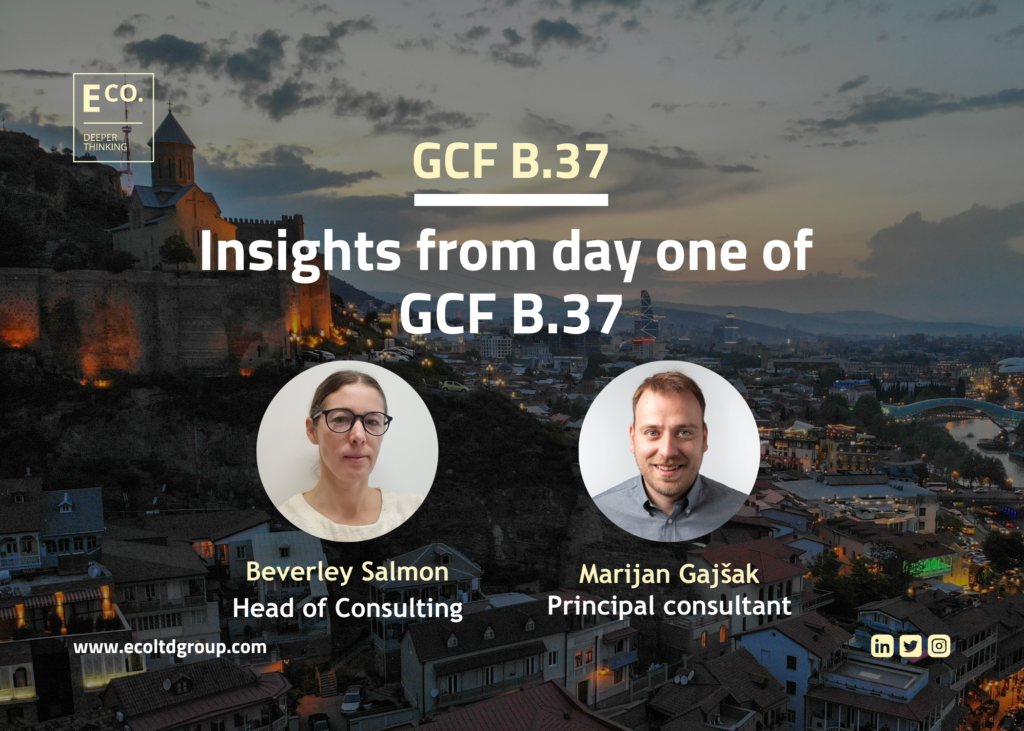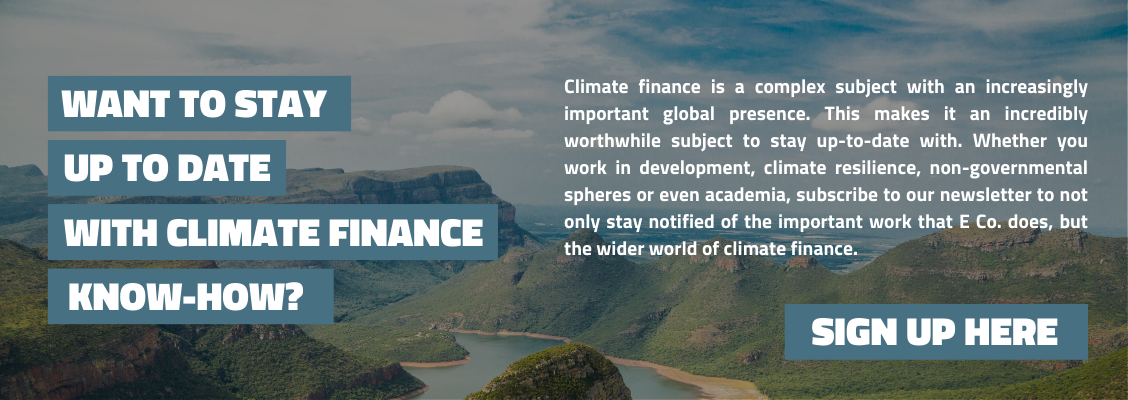Insights from day one of GCF B.37
23 October 2023, Category: All insights, News, Tags: climate change, climate finance, gcf, GCF B.37, Green Climate Fund

From the 23 to the 25 October 2023, Tbilisi, Georgia, is home to the 37th Green Climate Fund Meeting of the Board (GCF B.37). GCF B.37 is scrutinising fifteen new project approvals for a total of USD 736.4 million in GCF funding, as well as several re-accreditations. E Co’s Head of Consulting, Beverley Salmon, and Principal consultant, Marijan Gajsak have given us their on-the-ground insights for the first day, having been in attendance at this final board meeting of 2023.
Alongside the fifteen projects up for approval, the Board will also be considering:
- The revised strategy of the Readiness and Preparatory Support Programme;
- A review of the Project Preparation Facility (PPF);
- And the outcomes of the second replenishment (GCF-2), amongst other things.
Beverley and Marijan have gained insights from both the halls of GCF B.37, connecting with fellow GCF project developers and stakeholders, and within the meeting room of the GCF board itself – as we’re standing in as Private Sector Observers (PSOs) on this occasion also.
Here are their key takeaways from day one of GCF B.37.
Key takeaways
On the board room
With Mafalda Duarte taking over as CEO of the GCF, and the opening by Nino Tandilashvili – the Board Member from Georgia – it was encouraging to note the number of women and percentage split in the room. 75% of the Active Observers are women – and while this is only from a total of four, this is nonetheless an important point to make. But much more significantly, around 40% of the Board was represented by women.
On GCF strategy
Mafalda reiterated the GCF strategy of delivering $30 billion of climate finance by 2050 (30 by 50). Pertinent to this was the background of the Replenishment Conference, held on 5 October. While 75% of partner countries have now pledged a total of USD 9.3 billion dollars, there were calls for the remaining (five) countries to step up in their contributions to the updated strategic plan (USP-2).
On investment
The board discussed the Fund’s allocation parameters when it comes to tracking the origin of the funds being allocated to and from the GCF. This is especially interesting from the point of view of having more of an ESG framework implemented internally and generally.
One question was raised “How much of the funds coming to the GCF is coming from the fossil fuel industry?” leading to discussion on the World Bank-managed trust fund, particularly calls for clarity on the fossil fuel investment elements as the GCF should ‘walk the talk’ and remain aligned with the ideology of the trustees and the requirements of the Paris Agreement. The board was aligned in its opinion on this matter and approved the document options for the sustainable and responsible investment of GCF funds going forward.
On regional presence
The Green Climate Fund’s Regional Presence Feasibility Study was presented by Dalberg, third-party consultants. Essentially, the GCF examined the possibility of having more regional presence as the current headquarters – Songdo in South Korea – is a difficult location in terms of time zones, language barriers, and transactional costs. This discussion around regional presence spoke to the complexity of the global fund, but also the potential for innovation in communication and access modalities.
Regional presence models indeed raise the questions of how many and for who, but the biggest question was raised at the beginning of the presentation by Dalberg, and reiterated by many Board Members, which is ‘at what mandate’? If focused on increasing access and effectiveness, as raised by Ursula Fuentes, there are many opportunities for regional presence to “Bring the GCF closer to the countries it serves.”
Overall, the Board was divided in their opinions. Some see this as an absolute need, bringing the GCF closer to the recipient countries and helping address barriers, while others seek for more caution, especially due to the complex coordination and high costs associated with it. From a private sector perspective, increasing and improving links with NDAs and DAEs via a GCF regional network approach could help increase the private sector engagement for the GCF, as well as build overall capacity of the GCF. The issue will be further considered and no final conclusion was made.
On REDD+
The GCF Secretariat presented a REDD+ Result-based payments pilot programme. Even though the GCF have already invested more than half a billion of funds into the REDD+ projects, financing all phases such as readiness, implementation, and results-based payment, the pilot project envisages to finance only phase three through to more a granular and disaggregated approach – in tranches.
However, it appears that REDD+ projects remain a challenge for the GCF, and in general globally. The board had a number of questions and concerns, concerning geographical distribution criteria that would favour some countries over others, as the pilot project would only finance the final phase; results-based payments.
Alongside this, some board members requested more time to scrutinise the proposal due to the complicated and technical topic. Finally, there are concerns around carbon pricing as some board members believe current prices are too low.
We would love to connect with you if you are attending GCF B.37 and discuss our mutual projects. If you’re interested in catching up with Beverley or Marijan, feel free to connect with them directly on LinkedIn, or send us an email via: amy@ecoltdgroup.com.
Keep up-to-date with the GCF and more climate finance know-how
Climate finance is a complex subject with an increasingly important global presence. This makes it an incredibly worthwhile subject to stay up-to-date with. Whether you work in development, climate resilience, non-governmental spheres or even academia, subscribe to our newsletter to not only stay notified of the important work that E Co. does, but the wider world of climate finance.
Looking for insight into climate finance? Look no further
Get in touch with our climate finance consultants to discuss a project you’re working on and create successful, fit-for-purpose projects, now and in the future. Email us at: amy@ecoltdgroup.com or find us at the following:
Twitter: @ecoltdnews
LinkedIn: E Co.
Instagram: @ecoltdnews

Join the conversation by posting a comment below. You can either use your social account, by clicking on the corresponding icons or simply fill in the form below. All comments are moderated.